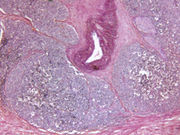Ethnicity influences patient decision to pursue active treatment and serial biopsies in active surveillance
TUESDAY, Aug. 2, 2016 (HealthDay News) — For men with low-risk prostate cancer, factors such as ethnicity influence patient decision to pursue active treatment during active surveillance, according to a study published online in The Journal of Urology.
Scott P. Kelly, Ph.D., from the Georgetown University Medical Center in Washington, D.C., and colleagues conducted a retrospective study involving 2,228 men diagnosed with low-risk prostate cancer who did not receive treatment within the first year of diagnosis. Factors associated with time from diagnosis to active treatment were examined.
The researchers found that 27 percent of the men began active treatment at a median of 2.9 years during follow-up. Compared with non-Hispanic white men, non-Hispanic black men were marginally more likely to begin active treatment, independent of baseline and follow-up clinical measures (hazard ratio [HR], 1.3; 95 percent confidence interval [CI], 1.0 to 1.7). Among those who remained on observation, rebiopsy within 24 months of diagnosis occurred at a slightly lower rate for non-Hispanic black than non-Hispanic white men (HR, 0.70; 95 percent CI, 0.60 to 1.0). Independent of race, Gleason grade progression (HR, 3.3; 95 percent CI, 2.7 to 4.1) and prostate-specific antigen doubling time less than 48 months (HR, 2.9; 95 percent CI, 2.3 to 3.7) correlated with active treatment initiation.
“Sociodemographic factors such as ethnicity and education may independently influence the patient decision to pursue active treatment and serial biopsies during active surveillance,” the authors write.
Copyright © 2016 HealthDay. All rights reserved.








